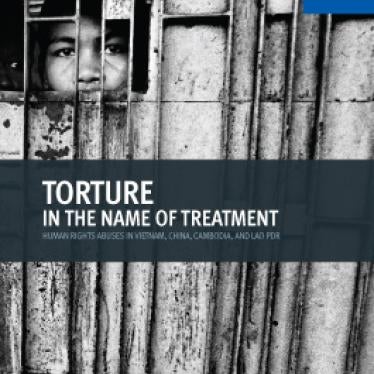Just before Human Rights Watch released our report on human rights violations in Chinese drug detention centers on January 7, the Chinese Ministries of Health and Public Security ordered detention centers and jails to improve medical care.
But improving health care is not the same as ending abuse.
Human Rights Watch's report, "Where Darkness Knows No Limits," found that abusive conditions are prevalent in many of China's drug detention centers. The report documents how individuals detained in some of these centers are routinely beaten, are forced to work for up to 18 hours a day without pay, have no access to drug dependency treatment, and are denied even basic medical care. One former detainee described to a New York Times journalist how inmates are beaten with electric prods. He said: "At least they'd give us helmets so we wouldn't injure our heads during convulsions." Two years ago we conducted a similar investigation on the human rights and health conditions of drug users in southern China. That report, "An Unbreakable Cycle," found similar horrendous abuses, but the research took place before the Chinese government put in place, in 2008, its most significant and comprehensive anti-narcotics legislation.
In the research for the most recent report, we wanted to know if the 2008 Anti-Drug Law had changed anything to improve respect for the basic rights of drug users. The law positioned the Chinese government's approach to drug use as "human-centered," referring to drug users as "patients" and promising legal protections for suspected and convicted drug users.
While there were some changes in rhetoric, in reality, conditions in drug detention centers are as inhumane as they were two years ago.
The problems in these centers run deep.
With physical abuse rampant and relapse rates high, increasing access to medical care for detainees is not the solution--the solution is to shut down these drug detention centers.
According to UNAIDS, half a million people in China are confined in drug detention centers at any given time. These centers, which warehouse some of China's most vulnerable people in squalid and crowded conditions, serve as incubators for infectious diseases. With a relapse rate of 96 percent, they also fail at their stated mission: rehabilitation.
The United Nations Office on Drugs and Crime agrees. Giovanni Nicotera, director of the agency's China office, told AP : "Being detained in these centers not only does not help drug users to recover, as evidenced by the high rates of relapse, but also increases the likelihood that an individual will become infected with HIV."
The incarceration of suspected drug users in China, who can be locked up for seven years on one single possession charge, happens without trial or judicial oversight. Wan Yanhai, founder of the Beijing-based Aizhixing institute, which offers programs for drug users, said, "Many drug users, when caught by police, would rather admit that they are trafficking drugs than using drugs because at least there is some kind of legal procedure involved in a drug trafficking charge."
This is an amazing statement, considering that in China drug traffickers are routinely executed. For suspected drug users to prefer trafficking charges shows just how bleak the odds of surviving drug detention are.
Our report title comes from an interview with one drug user in describing his experience in the Chinese "rehabilitation" system: "I am a former drug addict. I started using in 1990. I've tried to get clean and have been in compulsory [drug rehabilitation] labor camps more than eight times. I just cannot go back to a forced labor camp-[it is] a terrifying world where darkness knows no limits."
The announcement by the Chinese Ministry of Public Security and Ministry of Health that they intend to improve medical care in drug detention centers is an important acknowledgment of a problem; but the solution is wrong. Rather than improve conditions within drug detention centers, these centers should be shut down. In their place, China should develop and expand voluntary, community-based outpatient treatment programs that respect human rights and are consistent with international standards.






